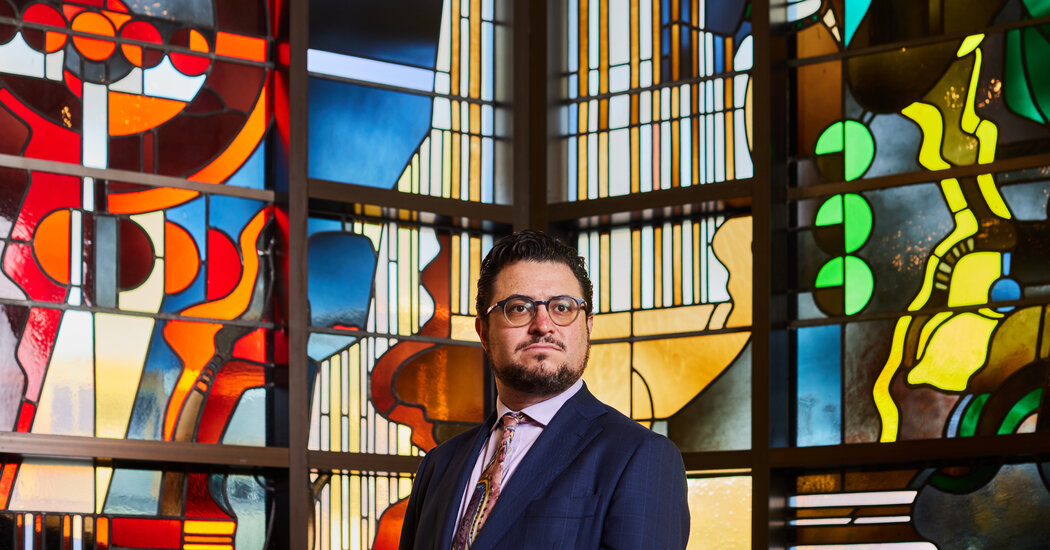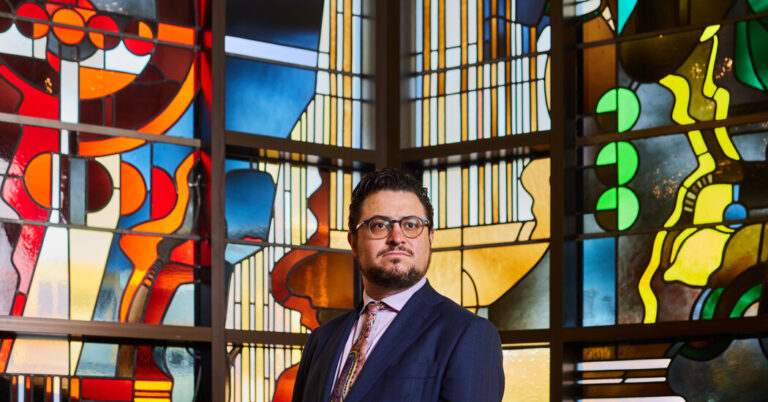To members of his synagogue, the voice that blared from the speakers at Congregation Emanu El in Houston sounded just like that of Rabbi Josh Fixler.
At the same steady pace his congregation had grown accustomed to, the voice delivered a sermon on what it meant to be a neighbor in the age of artificial intelligence. Then, Rabbi Fixler went to the bimah himself.
“The audio you heard a moment ago might sound like my words,” he said. “But they weren’t.”
The recording was created by what Rabbi Fixler called the “Rabbi Bot,” an AI chatbot trained on his old sermons. The chatbot, created with the help of a data scientist, wrote the sermon, also delivering it in an AI version of its voice. During the remainder of the service, Rabbi Fixler intermittently asked Rabbi Bot questions aloud, which he promptly answered.
Rabbi Fixler is among a growing number of religious leaders experimenting with AI in their work, spurring an industry of faith-based tech companies that offer AI tools, from assistants that can do theological research to chatbots that can help to write sermons.
For centuries, new technologies have changed the way people pray, from radio in the 1920s to televisions in the 1950s and the Internet in the 1990s. Some AI advocates in religious spaces have gone even further back, comparing AI’s potential – and its fears – to the invention of the printing press in the 15th century.
Religious leaders used artificial intelligence to translate their live-streamed sermons into different languages in real time, broadcasting them to international audiences. Others have compared chatbots trained on tens of thousands of pages of Scripture to a fleet of newly trained seminary students, able to extract passages on certain topics almost instantaneously.
But ethical questions about using generative AI for religious tasks have become more complicated as the technology improves, religious leaders say. While most agree that using AI for tasks like research or marketing is acceptable, other uses of the technology, such as sermon writing, are seen by some as a step too far.
Jay Cooper, a pastor in Austin, Texas, used OpenAI’s ChatGPT to generate an entire service for his church as an experiment in 2023. He marketed it using robot posters, and the service attracted some curious new participants: “kinds of players,” said Mr. Cooper, who had never been to his congregation before.
The thematic suggestion he gave to ChatGPT to generate various parts of the service was: “How can we recognize the truth in a world where artificial intelligence obfuscates the truth?” ChatGPT produced a welcome message, a sermon, a children’s program and even a four-verse song, which was the group’s biggest hit, Mr. Cooper said. The song said:
While algorithms weave webs of lies
We look up to the infinite skies
Where the teachings of Christ light our way
Dispelling falsehoods with the light of day
Mr Cooper has not used technology to write sermons since, preferring instead to draw on his own experiences. But the presence of AI in religious spaces, he said, poses a broader question: Can God speak through AI?
“This is a question that many Christians online don’t like at all because it raises a little bit of fear,” Cooper said. “It could be for a good reason. But I think it’s a noteworthy question.
The impact of artificial intelligence on religion and ethics has been a point of contact for Pope Francis on several occasions, although he has not directly addressed the use of artificial intelligence to help write sermons.
Our humanity “allows us to look at things with the eyes of God, to see connections, situations, events and to discover their true meaning,” the pope said in a message early last year. “Without this kind of wisdom, life becomes bland.”
He added: “Such wisdom cannot be sought by machines.”
Phil EuBank, pastor of Menlo Church in Menlo Park, California, likened artificial intelligence to a “bionic arm” that could enhance his work. But when it comes to writing sermons, “there’s that Uncanny Valley territory,” he said, “where you might get really close, but getting really close can be really weird.”
Rabbi Fixler agreed. He remembered being taken by surprise when Rabbi Bot asked him to include a sentence about itself in his sermon on artificial intelligence, a one-time experiment.
“Just as the Torah teaches us to love our neighbors as ourselves,” Rabbi Bot said, “can we extend this love and empathy to the AI entities we create?”
Historically, rabbis were early adopters of new technologies, particularly books printed in the 15th century. But the divinity of those books lay in the spiritual relationship their readers had with God, said Rabbi Oren Hayon, who is also part of Congregation Emanu El.
To assist his research, Rabbi Hayon regularly uses a custom chatbot trained on 20 years of his writings. But he has never used AI to write portions of sermons.
“Our job is not just to string together pretty sentences,” Rabbi Hayon said. “Hopefully writing something that is lyrical and moving and articulate, but that also responds to the uniquely human hunger and pain and loss that we are aware of because we are in human communities with other people.” He added: “It can’t be automated.”
Kenny Jahng, a technology entrepreneur, believes that fears about the use of generative AI by ministers are overblown and that leaning on technology may even be necessary to attract a new generation of tech-savvy young worshipers when church attendance across the country it is on the rise. decline.
Mr. Jahng, editor-in-chief of a media company focused on faith and technology and founder of an AI education platform, has traveled the country over the past year to speak at conferences and promote faith-based AI products. He also runs a Facebook group for tech-loving church leaders with more than 6,000 members.
“We’re looking at data that the spiritually curious in Gen Alpha, Gen Z are much more numerous than the boomers and Gen Xers who left the church after Covid,” Jahng said. “It’s this perfect storm.”
At the moment, most religious AI companies target Christians and Jews, but there are also chatbots customized for Muslims and Buddhists.
Some churches have already begun to infuse artificial intelligence into their services and websites
The chatbot on the website of Father’s House, a church in Leesburg, Florida, for example, appears to offer standard customer service. Recommended questions include: “What time are your services?”
The next tip is more complex.
“Why aren’t my prayers answered?”
The chatbot was created by Pastors.ai, a start-up founded by Joe Suh, a tech entrepreneur and attender of Mr. EuBank’s church in Silicon Valley.
After one of Mr. Suh’s longtime pastors left his church, he had the idea to upload recordings of that pastor’s sermons to ChatGPT. Mr Suh would then ask the chatbot intimate questions about his faith. He turned the concept into a business.
Mr. Suh’s chatbots are trained on a church’s sermon archives and information from its website. But about 95% of people who use chatbots ask them questions about things like service hours instead of delving deeply into their spirituality, Suh said.
“I think things will change eventually, but for now that concept might be a little ahead of its time,” he added.
Critics of religious leaders’ use of artificial intelligence have pointed to the problem of hallucinations, moments when chatbots make things up. While harmless in certain situations, faith-based AI tools that fabricate religious scriptures pose a serious problem. In Rabbi Bot’s sermon, for example, the AI invented a quote from the Jewish philosopher Maimonides that would pass off as authentic to the casual listener.
For other religious leaders, the AI question is simpler: How can sermon writers hone their craft without doing it entirely themselves?
“I worry for pastors, in some ways, that this isn’t going to help them train their sermon-writing muscles, which is where I think a lot of our great theology and our great sermons come from, years and years of preaching.” , said Thomas Costello , pastor of New Hope Hawaii Kai in Honolulu.
On a recent afternoon at his synagogue, Rabbi Hayon recalled taking a photo of his bookshelf and asking his AI assistant which of the books he had not mentioned in his recent sermons. Before AI, he would pull down the stocks themselves, taking the time to read their indexes, carefully comparing them to his own work.
“I was a little sad to miss that part of the process that is so fruitful, so joyful and rich and enlightening, that fuels the life of the Spirit,” Rabbi Hayon said. “Using AI allows you to get an answer more quickly, but you definitely missed something along the way.”





